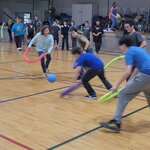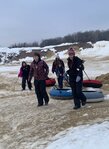, 0°
Wind: mph,






By DIANNE ALWARD-BIERY
Cleaver Staff Writer
HARRISON – In a world where traditional school days don’t answer all the needs of all students and their families, some programs are available to help fill in gaps, thus enabling students to “catch up” and to have a more rounded educational experience. SPARKS-Ignite offered by the Clare-Gladwin RESD is such a program, and a diverse one at that. SPARKS stands for Students Participating in Academics and Recreation for Knowledge and Success, and Ignite is SPARKS at the next level.
Rebecca Idzikowski, director, and Kelly Humphrey, co-director, took some time last week to speak with the Cleaver about their work with SPARKS-Ignite students and just what it takes to keep their longtime program and its offerings on the front burner for kids and their families.
“We just celebrated our 20th year of SPARKS,” Idzikowski said, adding that the program is a federally funded program, through the 21st Century Learning Centers. She explained that the federal funds are then allocated to the State of Michigan Department of Education, which then has a grant competition and Idzikowski and her staff then write for it.
“We partner with our schools, and also partner with Michigan State University Extension,” she said. “They’re our co-applicants on the grant. It’s a highly competitive grant and they have a lot more interest than they have funding for.”
She explained that each site has $150,000 in funding for the July 1-June 30 calendar year, which breaks down to six weeks of summer plus 32 weeks of school year. With the grant covering everything from crayons and markers to staff, transportation, field trips, which leads to seeking economy of scale to ensure costs can be shared across the district. Additionally, there were some Child Care Stabilization funds applied for which allowed for offering students some enriched opportunities such as family experiences and field trips.
The SPARKS program is for out-of-school times, and in many of the RESD’s districts there is before school and after-school in every program. Six weeks of summer learning is also offered.
Before school programming raises the question of transportation, but that is by parent drop-off. That availability also helps with childcare for working families.
After school time runs Monday through Thursday until about 5:30 p.m. (varies per site) for at least 32 weeks in the school year, starting the third week of September and running through May. Transportation home is provided. In the summer, the program runs Monday through Thursday for six weeks, and includes five hours each day which is beyond the federal requirement of three hours. In the summer, in addition to breakfast and lunch each day, transportation is provided both to and from the site, as students are not already at school.
“At the high school level, we often have students who are interested in weightlifting, or getting homework done, or leadership,” Idzikowski said. “We have some leadership meetings and things like that, and open gym.”
She explained that SPARKS is for the elementary and middle school grades, and Ignite is for high school students. It used to all be called SPARKS, but after surveying students – which is done a couple times each year – a lot of high school student feedback showed those students wanted a separate identity and older focus for their program.
Idzikowski described some of the current programming, starting with after-school.
“They do homework help,” she said. “They provide clubs and high-interest activities for students. We have Enrichment; we focus on hands-on disguise learning. Students may not now that they’re learning or doing math, but we are. Project based, so they might have a STEM project or they might walk out with some sewing item that they created.”
Idzikowski said the program tries to gear projects toward what students are interested in and they would enjoy. That could mean starting out with reading a book or focus on a learning piece, then move on from there.
“Students go on field trips,” she said. “We have family events – and everything’s 100% free, paid for by the grant. School districts do a lot in partnering with us: they give us office space for our site coordinators, provide the space after school.”
That cooperation includes a partnership with Chartwells in the schools to provide nutrition, and SPARKS also get the in-house transportation rate to bus students home.
“Students will come to program, get dinner and a snack,” she said. “They get transportation home if they’re on the bus route, and they have that homework help and enrichment. At the high school level we do credit recovery also to help students graduate on time.
“While we do all that homework piece and focus on academics for kids, we also partner with other areas in the school. We might partner with set-building for Drama Club. There is no SPARKS-type student; any student can be a SPARKS student, any student can be an Ignite student. And if we don’t have that club yet, we’re happy to look into how to make it.”
Idzikowski then spoke of an Esports tournament scheduled for March 2, with all the area Esports clubs coming to the RESD for a day of pizza, fun, T-shirts and trophies.
She then spoke of the types of field trips offered as being fun and educations.
“We’ll go to the zoo [Saginaw], we’ve gone to Mackinac Island, gone to Grand Rapids,” she said. “We’ve gone to the Henry Ford Museum. Every year Snowsnake is a great partner; we take kiddoes and families to Snowsnake every year. We have a fire, roast marshmallows and have s’mores, hot cocoa.”
The program has 14 sites, and is K-12 in nearly every district, which includes Beaverton, Coleman, Farwell, Gladwin and Harrison schools. In Clare the program is K-4.
“One of the grants we’re writing for is Clare Middle,” she said. “And that would make us temporarily K-12 because we have and Out of School Time grant through the Michigan Department of Ed, so that’s state funding. This is our second year; we applied as soon as we could get it. We partner with Clare High in Out of School Time and work a lot with robotics, credit recovery, and in the school year we do weightlifting and any kind of science, math, scrapbooking – whatever kind of clubs our students are interested in.”
Idzikowski said the program focuses on creating opportunities for students, providing experiences and making things easier for working families.
“It’s 100% free and it’s a safe place for students to be,” she said. “We all know America after 3 p.m. has a lot of statistics about things that can happen: crimes, accidents and students not being supervised. In rural districts it’s especially imperative to have these after school time programs. There are waiting lists across the country, but when you look at waiting lists for rural communities it’s often doubled.”
Accomplishing these opportunities requires personnel, and Idzikowski said there is one multi-site coordinator who oversees two programs. In Farwell that is a full-time employee who oversees Farwell Middle and Farwell High.
Generally, there is a school staff member who works 16 hours per week, and is there all during the program plus a full staff.
“We love when our staff can be from the school day – paraprofessionals and certified teachers,” she said. “Because we can seamlessly bring those academic pieces from the school day and what they’re working on. It’s a great opportunity for teachers who don’t feel they have enough time in the school day to get a project in, and to get students excited afterward.”
Idzikowski said that it is a great atmosphere after the school day for getting to know students in a different way.
SPARKS-Ignite caps its student participation at 45 per site and is serving a total of 630 students with a waiting list for more.
The program surveys parents yearly, and also sends out periodic surveys throughout the year. The grant requires an external evaluator to do the survey of parents and maintain the data. The evaluator provides site data as well as overall grantee data. MSU also provides data, looking at both site and grantee data.
“Our most recent grantee data shows that parents really are happy about our safety,” Idzikowski said. “The fact that kids have somebody who cares about them in those programs. There’s something to eat, and there’s homework support.”
She said there is a focus on trying to tailor the program to what students’ needs are, and sometime it’s as simple as the idea that kids vote with their feet.
“If kids aren’t liking the programs, especially at the elementary level – and sometimes they’re there out of necessity because it’s a great childcare opportunity – if students aren’t feeling like it’s worth their time they’ll let us know,” she said. “That’s why it’s really important for us to provide some really cool opportunities, some great learning experiences.
“Help them feel successful, give them those leadership opportunities.”
To that end, there are student and family advisory groups which helps staff keep a finger on the pulse of what students need.
Idzikowski said she is proud of the fact that there are so many partners in support of the SPARKS-Ignite program, including school custodial teams who have extra jobs to do, the schools that provide the rooms, food service. Also appreciated is their partner MSU Extension which does financial literacy with students, as well as attending family events to give learning components for families, increasing positive family experiences.
In speaking of the appreciation for community support, the question of local business support arose. Humphrey noted a recent occasion when a site coordinator wanted to have a conversation with a local T-shirt shop to show kids how to do design and screen printing. Idzikowski added that there are tours of local businesses, and that recent visit to senior centers included having senior buddies and playing games.
In a similar vein are the community service projects wherein students give back to their communities. A recent project was stuffing animals for nursing facilities and for law enforcement and firefighters to use as children’s comfort animals.
“All of our Harrison SPARKS before Christmas made care packages to take to the nursing homes,” Humphrey added.
All these activities afford kids, young and old, an opportunity to become invested in their communities and to learn the interconnectedness that makes a community work.
No matter how good or effective a program may be, each comes with its own set of obstacles and costs. For the SPARKS-Ignite that comes down to transportation costs and staffing. Idzikowski said that while this program receives funding equal to that of other funded programs, in a rural district a large portion of those dollars are devoured by transportation costs. That, however, is a cost happily paid in order to get those students in programs. And as far as staffing, SPARKS-Ignite is always looking for staff as well as community partners.
Idzikowski wrapped up the interview by noting the program has both federal and local goals.
“Those goals are to increase overall health and wellness, increase grades, increase school day attendance,” she said. “We know that across the country post-COVID there’s a huge increase in absences. So, that’s one of our goals, and we consider regular attendees those who attend the program 30 days or more. And we show that regular attendees do have a significant reduction in school suspensions and an increase in school day presence.
“We have a lot of data that shows the more a student comes to program, the more impacts we have in those areas. Across all 14 sites, we’re really looking at community engagement and family engagement – providing those positive interactions for families and also within the communities where we live.
Comments
No comments on this item Please log in to comment by clicking here